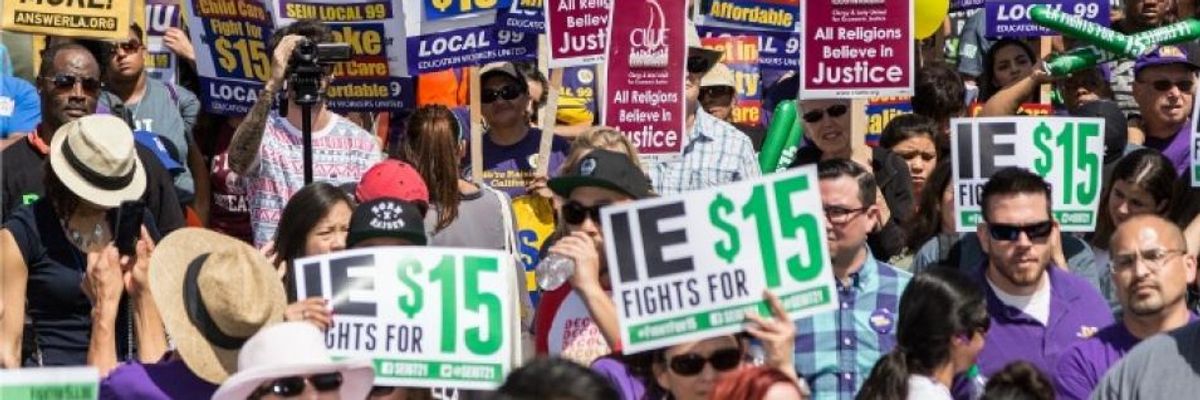In what is being described as a huge victory for the tens of thousands of workers across the country who have for years organized, rallied, and gone on strike for higher wages, Target on Monday announced that it plans to raise the company-wide minimum hourly wage to $11 by next month and $15 by 2020.
"We won't stop until everyone, everywhere, wins $15 an hour and union rights."
--Steven Suffridge, Fight for $15
"Five years ago, when 200 New York City fast-food workers first walked off the job for $15 an hour and union rights, nobody gave us a shot. Since then, we've spread this movement to every corner of the country and beyond fast-food. We did what they said we couldn't: we won. We won in the states, in the cities, with the big politicians and with the big corporations," Steven Suffridge, a Minneapolis McDonald's Worker and Fight for $15 organizer, wrote in an email reacting to the news. "And today, we won $15 an hour for all Target employees."
In celebration, Fight for $15 and other groups began circulating a graphic that echoes Suffridge's message: "When we fight, we win!"
Immediately upon seeing the news of the Target wage boost--which will affect over 320,000 workers throughout the U.S--activists and lawmakers immediately began raising the question: if Target can pay its workers a decent wage, why can't Walmart, McDonald's, and other profitable low-wage corporate giants?
"C'mon McDonalds, Walmart, and everybody else," wrote Rep. Keith Ellison (D-Minn.), who recently celebrated Minneapolis lawmakers for overwhelmingly voting to raise the city minimum wage to $15 by 2024. "Pay your workers right!"
As Common Dreams has reported, wages have remained largely stagnant for decades even as CEO pay and corporate profits have continued to soar. According to a recent analysis by the Economic Policy Institute, the compensation of top American CEOs has grown by 937 percent since 1978; typical worker pay rose by only 11.2 percent over that same time period.
With little indication that the Republican-dominated Congress--much less President Donald Trump--has any intention of acting to boost the federal minimum wage, workers have taken it upon themselves to organize and fight back against entrenched inequities and for a livable wage.
Since the Fight for $15 movement kicked off in 2012, many major cities--including Los Angeles, Seattle, and Pittsburgh--have committed to raising the minimum wage to $15 an hour. Democratic members of Congress, too, have begun signing on--the Raise the Wage Act, which would raise the federal minimum to $15 an hour, currently boasts 165 co-sponsors.
Even with these tremendous victories, there's still a long way to go, organizers acknowledge. Target, for instance, remains viciously anti-union, a fact that presents major questions about the company's professed commitment to the well-being of its workers.
But Suffridge concluded that if workers are able to keep up the pressure on corporations and politicians, the momentum sparked by sustained action across the country "is unstoppable."
"If Target can pay $15/hour, billionaire corporations like McDonald's can do the same," Suffridge concluded. "We won't stop until everyone, everywhere, wins $15 an hour and union rights."

